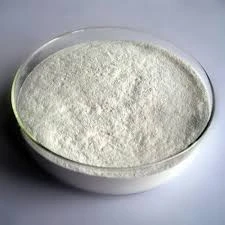
Oct . 11, 2024 10:18 Back to list
hpmc-hydroxypropyl methyl cellulose manufacturer
Understanding HPMC The Role of Hydroxypropyl Methyl Cellulose Manufacturers
Hydroxypropyl Methyl Cellulose (HPMC) has grown increasingly significant in various industries due to its versatile properties and applications. As a non-ionic, cellulose-based polymer, HPMC is derived from natural cellulose, making it an eco-friendly option for numerous formulations. This article explores the role of HPMC manufacturers in producing high-quality hydroxypropyl methyl cellulose and highlights its uses across different sectors.
What is HPMC?
HPMC is a modified cellulose compound known for its unique ability to form gels, act as a thickening agent, and stabilize emulsions. Its solubility in water, combined with its film-forming abilities, makes it ideal for a multitude of applications, including pharmaceuticals, food products, cosmetics, and construction materials. The versatility of HPMC stems from its several properties, such as viscosity control, adhesive capabilities, and its mildness toward skin and mucosa.
The Importance of HPMC Manufacturers
HPMC manufacturers play a crucial role in ensuring the availability of high-quality, standardized products that meet the specific needs of various industries. The manufacturing process involves several steps, including cellulose extraction from plant sources, chemical modification by etherification, and purification. Each stage must be meticulously controlled to produce HPMC with the desired molecular weight and viscosity characteristics.
These manufacturers often invest in advanced technologies and stringent quality control measures to ensure that their products comply with international standards. For instance, in the pharmaceutical field, HPMC must meet stringent regulations to ensure safety and efficacy. Manufacturers often implement Good Manufacturing Practices (GMP) to guarantee the purity and consistency of their products.
Applications of HPMC
hpmc-hydroxypropyl methyl cellulose manufacturer

1. Pharmaceutical Industry In pharmaceuticals, HPMC is widely used as a binder in tablet formulations due to its excellent adhesion properties. Its film-forming abilities also make it suitable for enteric coatings, which help protect sensitive compounds from the acidic environment of the stomach, ensuring targeted release in the intestines. Furthermore, HPMC acts as a thickening agent in various formulations, enhancing the stability and viscosity of suspensions and solutions.
2. Food Industry In the food sector, HPMC serves as a food additive, providing texture and stability to products. Its ability to retain moisture makes it a popular choice in low-fat food products to simulate the creamy texture typically achieved with higher fat content. The use of HPMC in gluten-free products is also notable, as it helps improve the dough's elasticity and texture.
3. Cosmetics and Personal Care HPMC is prevalent in the cosmetics industry, being used in creams, lotions, and gels. Its thickening and stabilizing properties improve the consistency and application of these products. Additionally, HPMC’s non-toxic nature and compatibility with skin make it a preferred ingredient in many personal care formulations.
4. Construction Industry In construction, HPMC is incorporated into tile adhesives, paints, and coatings. It enhances workability, provides water retention, and improves adhesion performance, which is particularly crucial in ensuring the longevity and durability of construction materials.
The Future of HPMC Manufacturing
The demand for HPMC is on the rise, driven by the increasing need for sustainable and multifunctional materials across industries. Manufacturers are continually innovating to enhance the properties of HPMC through various modifications and formulations. Research into new applications, such as in biodegradable products and advanced drug delivery systems, signals a promising future for HPMC.
In conclusion, HPMC manufacturers are pivotal to the integrity and advancement of various industries. Their commitment to quality and innovation ensures that hydroxypropyl methyl cellulose continues to serve as an indispensable ingredient in our daily lives. As industries evolve, the role of these manufacturers in providing tailored HPMC solutions will be critical for meeting the challenges and demands of the market.
-
Versatile Hpmc Uses in Different Industries
NewsJun.19,2025
-
Redispersible Powder's Role in Enhancing Durability of Construction Products
NewsJun.19,2025
-
Hydroxyethyl Cellulose Applications Driving Green Industrial Processes
NewsJun.19,2025
-
Exploring Different Redispersible Polymer Powder
NewsJun.19,2025
-
Choosing the Right Mortar Bonding Agent
NewsJun.19,2025
-
Applications and Significance of China Hpmc in Modern Industries
NewsJun.19,2025







